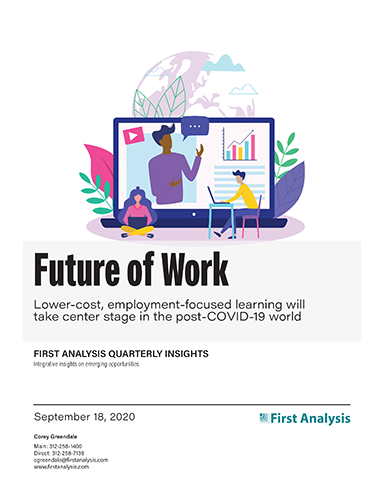Quarterly insights: Future of work
Lower-cost, employment-focused learning will take center stage in the post-COVID-19 world

Stagnant enrollment is just one of several long-term trends that had many traditional colleges struggling long prior to the COVID-19 crisis. Between these trends and the seismic shock of COVID-19, the outlook for many traditional colleges will likely remain cloudy.
While there appears to be some level of bipartisan political support for more employment-relevant training, proposals for government-driven efforts to promote such options may or may not come to fruition, and workers are not waiting: Participation in shorter, career-relevant, mostly online learning programs has been increasing for some time and skyrocketed when the pandemic hit.
The shortfall of workforce digital skills relative to employer needs is also increasing employer demand for employees with specific skills certifications, and employers are investing in programs that promote such low-cost, employment-focused learning paths.
TABLE OF CONTENTS
Includes discussion of CHGG, MSFT, PS, TWOU and six private companies
- Many traditional colleges are and will remain under pressure
- Individuals investing in education, with a shift toward shorter, career-relevant content
- Employers may de-emphasize college but will invest in career-relevant learning to close digital gap
- Future of work sector continues post COVID-19 rally
- M&A activity sees strong rebound in Q3
- Remote learning continues to define private investment in Q3
Many traditional colleges are and will remain under pressure
According to the U.S. Department of Education’s National Center for Education Statistics, undergraduate enrollment in degree-granting postsecondary institutions peaked in 2010 at 18.1 million students and declined to 16.6 million by 2018. Enrollment is expected to recover only slightly, to 17.0 million, by 2029, though COVID-19 is causing a dislocation in the trajectory. The trend and outlook in part reflect the decline in the number of people of traditional college age in the U.S. population, and this is just one of several secular factors placing pressure on many traditional colleges long prior to the pandemic. Other factors included the formerly strong job market increasing the opportunity cost of foregoing earning years to attend college full-time, pressure on funding for many public institutions, and challenges in differentiating and attracting students at residential colleges dependent on continually increasing tuition levels. A recent study by education news organization The Hechinger Report found that more than 500 of the colleges and universities in an analysis of nearly 2,700 schools showed two or more warning signs (among up to four scoring categories) in its Financial Fitness Tracker.

Request full report
To access the full report, please provide your contact information in the form below. Thank you for your interest in First Analysis research.
